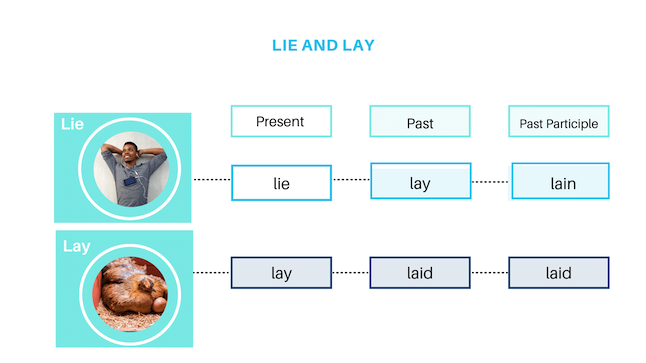 Photo by [James Forbes] on [Unsplash]
Photo by [James Forbes] on [Unsplash]
Two of the Most Commonly Misused Words
If you are confused about the difference between how to use the words lie and lay, you’re not alone. Misuse of these two words is one of the most common grammatical errors. Professional writers, editors, and teachers mistake these two, often.
Once you learn the simple trick to distinguish how to use them, being correct will be a lot easier. Plus, we’ll dig deeper and look at past tense and past participles so you can nail your usage every time.
Sentence Structure is the Key
Every sentence has a subject and a predicate. The subject is a noun. The predicate is a verb to show the action the subject takes.
Mirabella eats.
John jumps.
Mirabella and_ John_ are the subjects. Eats and jumps are the predicates. Every complete sentence is based on this simple construction.
When you introduce an action toward something, you have a new sentence component, the direct object.
Mirabella eats an apple.
John throws the ball.
The apple and the ball are objects. The subject acts on the object.
The presence or absence of a direct object is your key to using lie or lay.
Lie
Use the word lie when there is no object.
Mirabella lies on the floor.
John lies on the grass.
The prepositional phrases on the floor and on the grass describe where the action takes place. But Mirabella and John act only on themselves, not on an object.
One more confusion. The present participle and gerund for lie is lying. Substitute a y for ie.
Lay
Use the word lay when the action happens to an object.
Mirabella lays her purse on the table.
John lays the book beside him on the chair.
Purse and book are objects. Mirabella and John do something with them.
That’s the present tense. Easy, yes?
Going to the Past
When actions happened in the past, the use of the words gets confusing. The past tense is where things often go awry with word usage.
Lay
The past tense of lie is lay. Yes, it’s spelled and sounds just like the present tense of lay. It’s one of those instances where you’ve got to know your grammar. But it’s the verb you use when there is no object.
Mirabella lay on the grass, panting after her long run.
Saturday, John lay on the couch all afternoon watching TV.
Laid
When there’s an object, the past tense is laid.
Mirabella’s hen laid eggs every day for months.
John laid his book on the table.
Just remember, when there’s an object use laid.
Past Participle
One more confusion for lie and lay is the past participle. For most verbs, the past participle is the same word as the past tense.
A past participle is used with a helping verb of have (have / has / had) to form the present and past perfect tenses. It is also used to modify nouns and pronouns.
Simple past tense and past participle.
He sliced the bread yesterday to make croutons.
He had sliced his finger while he was cooking yesterday and had to go to the emergency room.
Lie
The past participle of lie is lain.
Mirabella’s farm has lain fallow for many years.
After his trip to the hospital, John had lain in the bed for hours before getting dinner ready.
Lay
The past participle of lay is laid, fitting the regular verb use where the past tense and the past participle are spelled the same way.
Mirabella was worried, her hen had laid in the same position since early morning.
John had laid his book on the floor and didn’t see it when he tripped.

You Are Not Alone
Lie and lay are two of the most confusing and misused words in English.
You lie down, but you lay something down. Lie does not require a direct object. Lay requires a direct object.
In the flow of writing, it’s easy to forget grammar rules while you’re driven by your passion. Fortunately, [ProWritingAid] remembers...always. Once you finish your writing, [ProWritingAid] will spot any grammar errors. One of the most used searches of the 20 available is the grammar check. We keep your writing grammar perfect.

